-
 Published: Oct 24, 2024
Published: Oct 24, 2024
-
 8 min. read
8 min. read
-
 Matthew Gibbons
Matthew Gibbons Senior Data & Tech Writer
Senior Data & Tech Writer
- Matthew is a marketing expert focusing on the SEO & martech spaces. He has written over 500 marketing guides and video scripts for the WebFX YouTube channel. When he’s not striving to put out some fresh blog posts and articles, he’s usually fueling his Tolkien obsession or working on miscellaneous creative projects.
Did you know that around 60% of Google searches don’t end in a click? Those searches are referred to — appropriately enough — as zero-click searches, and they’ve continued to grow more and more common over the years.
Naturally, this trend has marketers concerned. Search engine optimization (SEO) is one of the most valuable online promotion strategies, but it’s dependent on earning clicks. So, what is the relationship between zero-click searches and SEO? How does the former impact the latter?
That’s the question we’re going to answer on this page, which we’ll break down into the following topics:
- What are zero-click searches?
- What causes zero-click searches?
- How zero-click searches impact SEO
- How to optimize your content for zero-click searches
Keep reading to find out more, and then subscribe to Revenue Weekly — our email newsletter — to get more helpful marketing tips delivered straight to your inbox!
What are zero-click searches?
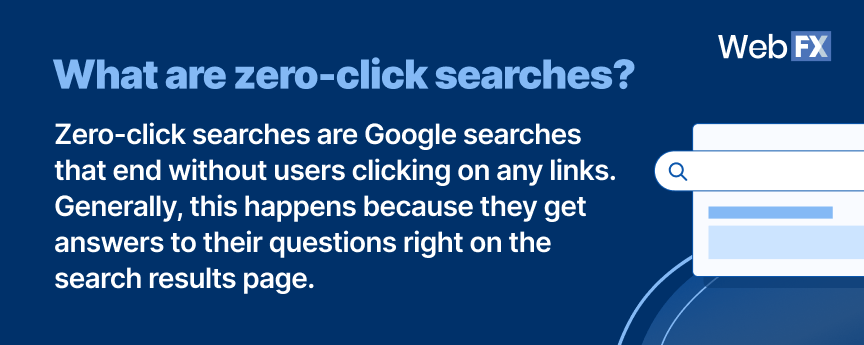
Zero-click searches are Google searches that end without users clicking on any links. Generally, this happens because they get answers to their questions right on the search results page. They search for their question, see the answer immediately, and don’t visit any other pages.
What causes zero-click searches?
Zero-click Google searches can result from numerous things, but usually, it’s because of Google search features.
“Search features” is a term that refers to anything on a search results page that isn’t a link to another site. There are many different types of search features, but below, we’ll focus on the four types that most commonly lead to zero-click searches:
Read on to learn more.
1. Featured snippets
Featured snippets are direct answers to questions that people search for, and they appear at the top of search results in the form of a short paragraph. The text of featured snippets is taken from a specific page, so, on a functional level, a featured snippet is another type of organic search ranking (earning featured snippets the name “position zero” in the SEO world).

2. Knowledge panels
Knowledge panels are more extensive than featured snippets, and they appear as a box on the right-hand side of the search results page. These panels are designed to summarize general information about specific people, places, or things.
Think about the type of info you might see at the top of a Wikipedia page — that’s what you can expect to see in knowledge panels. In fact, they’re often sourced from Wikipedia, along with other reputable sites.
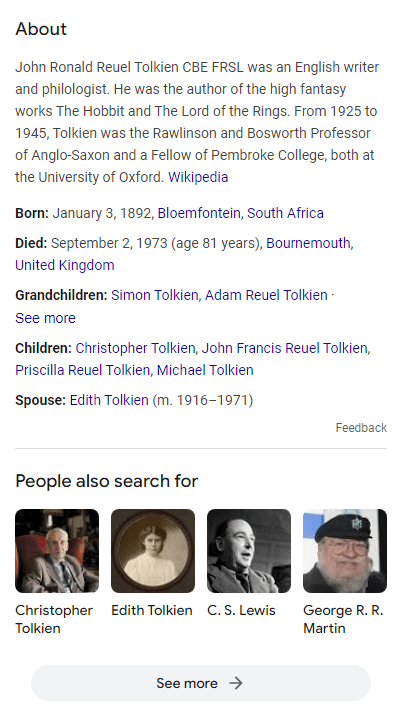
3. Direct answer boxes
Like featured snippets, direct answer boxes appear at the top of search results and give — well, a direct answer to a query. However, direct answer boxes provide the answer in just a few words (though there may be additional info beneath that).
These boxes show up in response to questions with an extremely simple answer. For example, if you search for the answer to a simple math equation or look up a celebrity’s age, you’ll likely see a direct answer box.
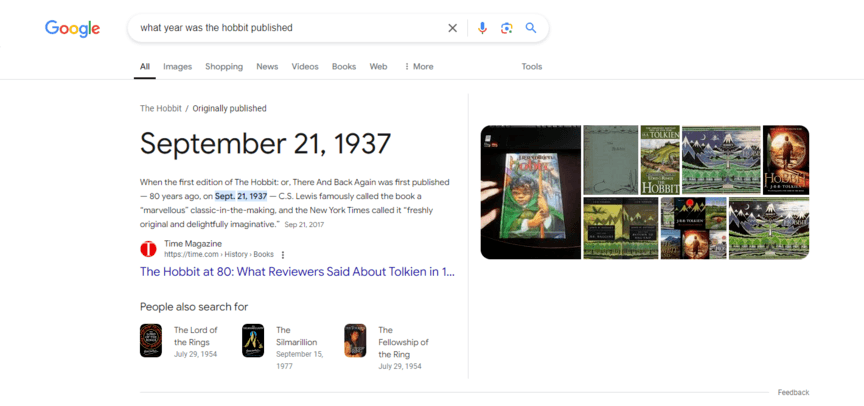
4. AI overviews
A relatively new Google search feature is AI overviews, which are AI-generated responses that appear at the top of search results pages. Unlike the other three features on this list, it’s a bit unclear to what extent AI overviews contribute to zero-click searches.
Google certainly wants people to get their answers from AI overviews, but many people still seem to feel distrust and annoyance toward them, leading a lot of users to deliberately ignore them. Even so, there are undoubtedly those who use AI overviews and (consequently) don’t click on any website links.
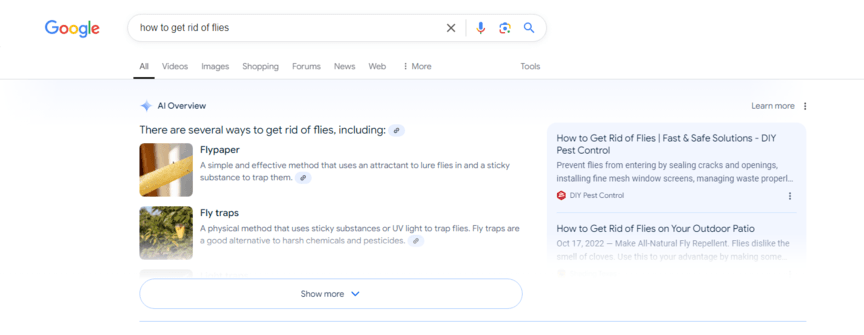
How zero-click searches impact SEO
Now that we’ve seen what contributes to zero-click Google searches, let’s talk about how those searches impact SEO. We’ll break this down into pros and cons, looking at each one in turn.
Pros of zero-click searches
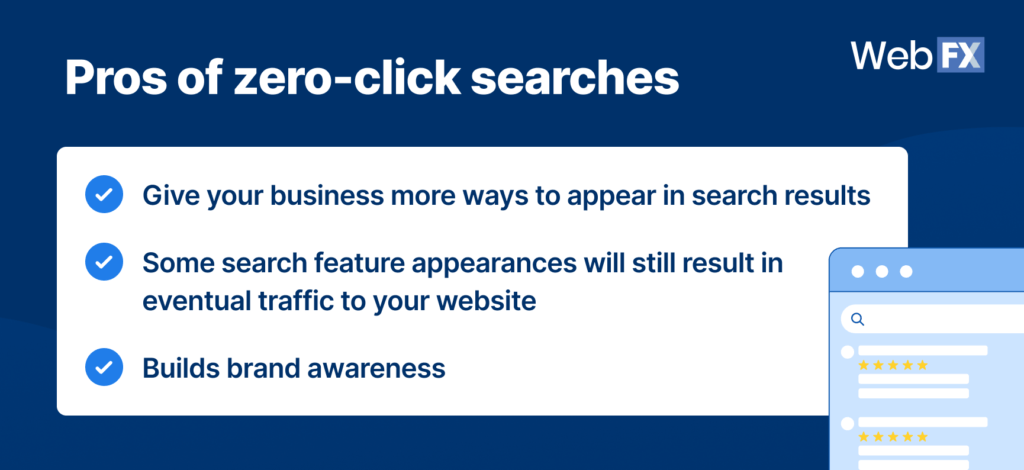
On the plus side, the search features that contribute to zero-click searches give your business more ways to appear in search results. Now you don’t have to rely purely on a traditional website ranking — you also have a shot at showing up in featured snippets, AI overviews, and more, all of which will credit your website.
Also, some of these search feature appearances will still result in eventual traffic to your website. Even among those who don’t click, you’ll still succeed at building brand awareness when your business helps them answer their query, making them more likely to visit your site down the road.
Cons of zero-click searches
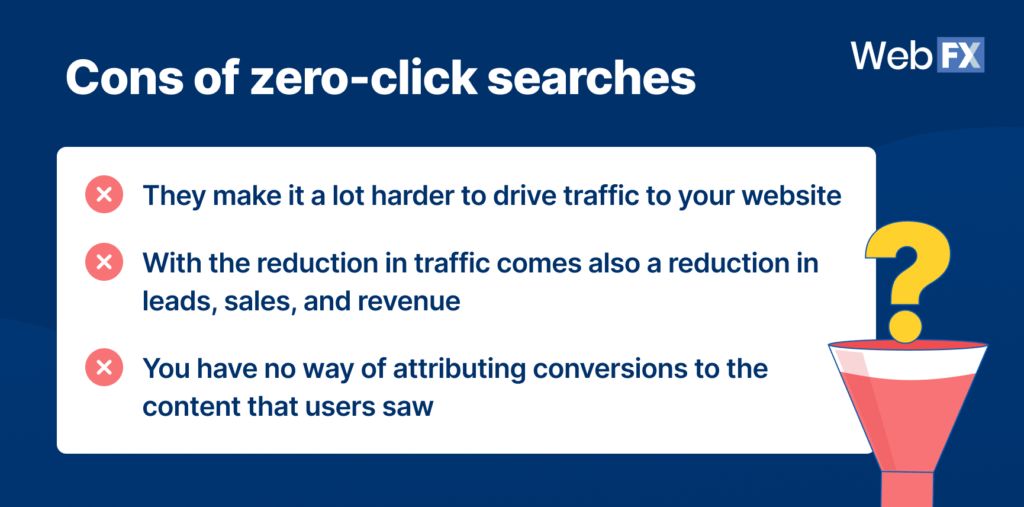
The obvious con of zero-click searches is that they make it a lot harder to drive traffic to your website. Earning website traffic relies on getting people to click on your site in search results, which of course doesn’t happen in a zero-click search.
With the reduction in traffic comes also a reduction in leads, sales, and revenue. That’s clearly a big problem for your business, which is why it’s important to optimize your SEO strategy for zero-click searches.
Plus, even when zero-click searches do indirectly contribute to traffic and conversions down the line, you have no way of attributing those conversions to the content that users saw, since there are no clicks you can track back to it.
How to optimize your content for zero-click searches
Now that you know how zero-click searches impact SEO, you’re likely wondering how you can optimize for them. Here are three ways to do so:
We’ll go over each one briefly below.
1. Optimize for featured snippets
The first way to deal with zero-click searches is to optimize for featured snippets. As we mentioned a moment ago, getting your content to appear in featured snippets allows you to answer users’ questions and build brand awareness even if they don’t visit your website right away.
So, how do you optimize for featured snippets? The answer is that you look for ways to directly and succinctly answer your target keywords on your pages. So, if you target the keyword “what is accounting,” you should have a header on the page where you include a couple of sentences defining accounting.
2. Target more complex keywords
Another way to optimize for zero-click searches is to simply target different keywords. Certain types of keywords are more prone to result in zero-click searches than others. For example, the query “what does a paper company do” can be easily answered, but “what is the environmental impact of paper production” requires a much longer and more nuanced response.
When you target more nuanced and complex keywords, you have a lower chance of competing with search features. That makes it more likely that people will click on the link to your website, driving more traffic and, ideally, more revenue.
3. Use schema markup
We’ve looked at how to improve your chances of appearing in featured snippets, but there’s another method you can use that gives you a better chance of showing up in search features across the board. That method is to implement schema markup on your website.
Schema markup is a type of code that essentially helps Google’s algorithms better understand your content. The better Google understands your content, the more likely it is to use it in its search features, like AI overviews and knowledge panels.
Improve your zero-click search optimization with WebFX
We’ve explored the relationship between zero-click searches and SEO, and now it’s time for you to set to work optimizing your own SEO content for those searches. But you don’t have to do it alone. Many companies opt to partner with a professional marketing agency like WebFX, and you can too.
When you let us handle your SEO campaigns, you’ll still be in full control of everything, but we’ll do all the work. You’ll also get access to 29 years of experience with professional SEO services that will help you earn the highest possible rankings and revenue.
Interested in partnering with us for our SEO services? Just give us a call today at 888-601-5359 or contact us online!
-
 Matthew is a marketing expert focusing on the SEO & martech spaces. He has written over 500 marketing guides and video scripts for the WebFX YouTube channel. When he’s not striving to put out some fresh blog posts and articles, he’s usually fueling his Tolkien obsession or working on miscellaneous creative projects.
Matthew is a marketing expert focusing on the SEO & martech spaces. He has written over 500 marketing guides and video scripts for the WebFX YouTube channel. When he’s not striving to put out some fresh blog posts and articles, he’s usually fueling his Tolkien obsession or working on miscellaneous creative projects. -

WebFX is a full-service marketing agency with 1,100+ client reviews and a 4.9-star rating on Clutch! Find out how our expert team and revenue-accelerating tech can drive results for you! Learn more
Try our free Marketing Calculator
Craft a tailored online marketing strategy! Utilize our free Internet marketing calculator for a custom plan based on your location, reach, timeframe, and budget.
Plan Your Marketing Budget

SEO Success with KOA

Proven Marketing Strategies
Try our free Marketing Calculator
Craft a tailored online marketing strategy! Utilize our free Internet marketing calculator for a custom plan based on your location, reach, timeframe, and budget.
Plan Your Marketing Budget





